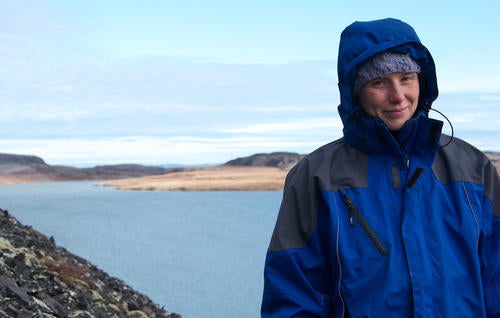
Feds invest $1.2 million into Waterloo research on Nunavut fisheries
Research will address climate change and rise of land masses after last glacial period.

Research will address climate change and rise of land masses after last glacial period.
By Amy Geddes Water Institute
University of Waterloo researcher Heidi Swanson is set to receive $1.2 million, over five years, from the Federal government’s $75 million Coastal Restoration Fund to perform community-partnered research. The aim of the project is to restore fish in the Coppermine River and other river systems near Kugluktuk, Nunavut. The funding is part of the $1.5 billion Ocean Protections Plan — the largest investment ever made to protect Canada's coasts and waterways.
Climate change and the rise of land masses after the last glacial period can leave fish stranded during migrations due to decreasing river flows. To address this critical issue, Swanson’s team will work alongside the Kugluktuk Hunter and Trappers Organization to identify migratory patterns and overwintering habits of Arctic char and Dolly Varden char in and around the Coppermine River. A restoration plan will follow for priority streams that support Inuit subsistence fisheries.
Swanson, an assistant professor from the Department of Biology, has been building relationships with subsistence fishers in Kugluktuk for over a decade. In a model example of community-driven scientific research, Swanson’s team has responded to concerns initially posed by the Kugluktuk Hunter and Trapper Association about their fishery — specifically, why numbers of Arctic char in the Coppermine River are in decline, and if there are streams used by migrating fish that can be restored to increase fish passage.
“The way the project started is that colleagues from Fisheries and Oceans Canada and I met with the Hunter and Trapper Association in Kugluktuk to hear about their fishery concerns,” said Swanson. “We developed this project based on those concerns.”
A significant portion of the funding will go to the association for traditional knowledge research and to hire local field and restoration workers.
 “This partnership between professor Swanson, her students, and the Kugluktuk Hunter and Trapper Association, is truly exemplary community-driven scientific research,” said Roy Brouwer, Executive Director of the Water Institute, of which Swanson is a member. “Such partnerships, that address local concerns, offer an important pathway to sustainable solutions to Canada’s Northern water challenges.”
“This partnership between professor Swanson, her students, and the Kugluktuk Hunter and Trapper Association, is truly exemplary community-driven scientific research,” said Roy Brouwer, Executive Director of the Water Institute, of which Swanson is a member. “Such partnerships, that address local concerns, offer an important pathway to sustainable solutions to Canada’s Northern water challenges.”
The Coastal Restoration Fund supports projects aimed at restoring some of our most vulnerable coastal aquatic habitats. Preference is given to projects that are multiyear and involve a broad number of partners that include Indigenous groups.
Listen to Swanson's interview with CBC radio.

Read more
The Government of Canada announces funding to support research in food policies and medical devices

Read more
Here are the people and events behind some of this year’s most compelling Waterloo stories

Read more
Meet five exceptional Waterloo graduate students crossing the convocation stage as Class of 2025 valedictorians
The University of Waterloo acknowledges that much of our work takes place on the traditional territory of the Neutral, Anishinaabeg, and Haudenosaunee peoples. Our main campus is situated on the Haldimand Tract, the land granted to the Six Nations that includes six miles on each side of the Grand River. Our active work toward reconciliation takes place across our campuses through research, learning, teaching, and community building, and is co-ordinated within the Office of Indigenous Relations.